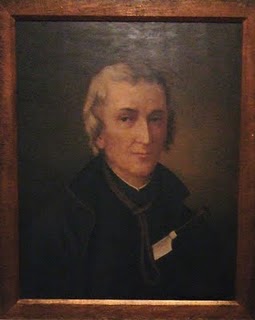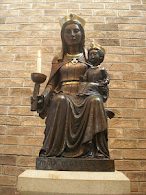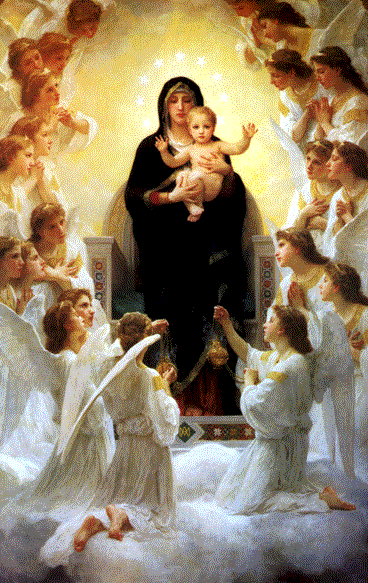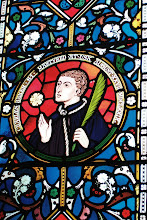This is the conclusion of the beautiful piece taken from the little book “Blessed David Lewis”. The booklet, published in 1960, was written by the late Canon J B Davies, at one time Parish Priest at Usk.
(FOR PART 1, SEE YESTERDAY’S POST.)
“He need not have worried. The kindly people of Gwent who had given him the affectionate nickname of “Tady Tlodion” (Father of the Poor), were not likely to turn away from him now when he needed help himself. When he was finally unfastened from the hurdle and stood by the gallows trying to steady himself till the giddiness should pass and his eyes could focus clearly once more, a great happiness must have come over him; wherever he looked he saw nothing but friendly, sympathetic faces. The gallows itself, had he known it, was proof of the people’s love for him. On the day before his execution, all the carpenters in Usk mysteriously disappeared taking their tools with them, and in his anxiety to get some sort of gallows erected the harassed Sheriff brought a convict from the gaol and promised him remission of sentence if he would do the work. The result was a botched job. Usually, while the noose was being tied round his neck the criminal stood on a cart which was then drawn away leaving him, if he was just a plain murderer, to swing until he died; but if, like Fr Lewis he was a Catholic priest, such a quick death was held to be too merciful, and he was cut down before losing consciousness and disembowelled while still alive. The shaky structure put up for Fr Lewis was so low that a trench had to be dug between the uprights to let his feet swing free of the ground. It is only fair to the convict to add that he was somewhat hampered in his work by occasional showers of stones from indignant bystanders.
when he needed help himself. When he was finally unfastened from the hurdle and stood by the gallows trying to steady himself till the giddiness should pass and his eyes could focus clearly once more, a great happiness must have come over him; wherever he looked he saw nothing but friendly, sympathetic faces. The gallows itself, had he known it, was proof of the people’s love for him. On the day before his execution, all the carpenters in Usk mysteriously disappeared taking their tools with them, and in his anxiety to get some sort of gallows erected the harassed Sheriff brought a convict from the gaol and promised him remission of sentence if he would do the work. The result was a botched job. Usually, while the noose was being tied round his neck the criminal stood on a cart which was then drawn away leaving him, if he was just a plain murderer, to swing until he died; but if, like Fr Lewis he was a Catholic priest, such a quick death was held to be too merciful, and he was cut down before losing consciousness and disembowelled while still alive. The shaky structure put up for Fr Lewis was so low that a trench had to be dug between the uprights to let his feet swing free of the ground. It is only fair to the convict to add that he was somewhat hampered in his work by occasional showers of stones from indignant bystanders.
To be dragged upside down at the age of sixty-three, with your head being violently bumped on an unsprung hurdle is not the best preparation for a public speech; very wisely, Fr Lewis had carefully thought out his dying manifesto while he was in prison. He delivered it, says Brother Foley, “with great animation”; in other words, the hwyl was on him. He spoke in English, but we can still hear the echo of his lilting Welsh accent: “Here is a numerous assembly,” he began, "the great Saviour of the world save every soul of you....A Roman Catholic I am! A Roman Catholic priest I am! Please now to observe....” Is it not Fluellen to the life – a Monmouth man also? But here was more than natural courage, here was the supernatural virtue of the soldier of Christ. At this moment he must have felt how deep were his roots in this pleasant land of Gwent: “I believe you are met here” he tells them, “to hear a fellow countryman speak”, and as he looked his last on a countryside he had loved, and served, so well, he looked back also with happiness on a long life spent among these “fellow countrymen” in which, as in his death, there was nothing of which he, or they, need feel ashamed...”
“He need not have worried. The kindly people of Gwent who had given him the affectionate nickname of “Tady Tlodion” (Father of the Poor), were not likely to turn away from him now
 when he needed help himself. When he was finally unfastened from the hurdle and stood by the gallows trying to steady himself till the giddiness should pass and his eyes could focus clearly once more, a great happiness must have come over him; wherever he looked he saw nothing but friendly, sympathetic faces. The gallows itself, had he known it, was proof of the people’s love for him. On the day before his execution, all the carpenters in Usk mysteriously disappeared taking their tools with them, and in his anxiety to get some sort of gallows erected the harassed Sheriff brought a convict from the gaol and promised him remission of sentence if he would do the work. The result was a botched job. Usually, while the noose was being tied round his neck the criminal stood on a cart which was then drawn away leaving him, if he was just a plain murderer, to swing until he died; but if, like Fr Lewis he was a Catholic priest, such a quick death was held to be too merciful, and he was cut down before losing consciousness and disembowelled while still alive. The shaky structure put up for Fr Lewis was so low that a trench had to be dug between the uprights to let his feet swing free of the ground. It is only fair to the convict to add that he was somewhat hampered in his work by occasional showers of stones from indignant bystanders.
when he needed help himself. When he was finally unfastened from the hurdle and stood by the gallows trying to steady himself till the giddiness should pass and his eyes could focus clearly once more, a great happiness must have come over him; wherever he looked he saw nothing but friendly, sympathetic faces. The gallows itself, had he known it, was proof of the people’s love for him. On the day before his execution, all the carpenters in Usk mysteriously disappeared taking their tools with them, and in his anxiety to get some sort of gallows erected the harassed Sheriff brought a convict from the gaol and promised him remission of sentence if he would do the work. The result was a botched job. Usually, while the noose was being tied round his neck the criminal stood on a cart which was then drawn away leaving him, if he was just a plain murderer, to swing until he died; but if, like Fr Lewis he was a Catholic priest, such a quick death was held to be too merciful, and he was cut down before losing consciousness and disembowelled while still alive. The shaky structure put up for Fr Lewis was so low that a trench had to be dug between the uprights to let his feet swing free of the ground. It is only fair to the convict to add that he was somewhat hampered in his work by occasional showers of stones from indignant bystanders.To be dragged upside down at the age of sixty-three, with your head being violently bumped on an unsprung hurdle is not the best preparation for a public speech; very wisely, Fr Lewis had carefully thought out his dying manifesto while he was in prison. He delivered it, says Brother Foley, “with great animation”; in other words, the hwyl was on him. He spoke in English, but we can still hear the echo of his lilting Welsh accent: “Here is a numerous assembly,” he began, "the great Saviour of the world save every soul of you....A Roman Catholic I am! A Roman Catholic priest I am! Please now to observe....” Is it not Fluellen to the life – a Monmouth man also? But here was more than natural courage, here was the supernatural virtue of the soldier of Christ. At this moment he must have felt how deep were his roots in this pleasant land of Gwent: “I believe you are met here” he tells them, “to hear a fellow countryman speak”, and as he looked his last on a countryside he had loved, and served, so well, he looked back also with happiness on a long life spent among these “fellow countrymen” in which, as in his death, there was nothing of which he, or they, need feel ashamed...”








.JPG)

.JPG)



.JPG)

Hello
ReplyDeleteI tried to post a comment a while back, so I apologise if you did get it but simply don't want to reply. I'm looking for someone who would be willing to make a translation of a C16 cywydd for me - I have a copy of one of the two extant ms copies, and a transcription, but the chap who made the latter for me gave up trying to translate the text! It's for purely private use, as a present for a friend. Do you know anyone who might be able to help?
exlaodicea
ReplyDeleteSorry, but I didn't get your previous comment. I've no idea where it ended up but I am glad you tried again. However, I have to say 'sorry' once more. I have no idea who could help you with your translation. It was nice to hear from you anyway. God bless - and may St David Lewis keep an eye on you too!